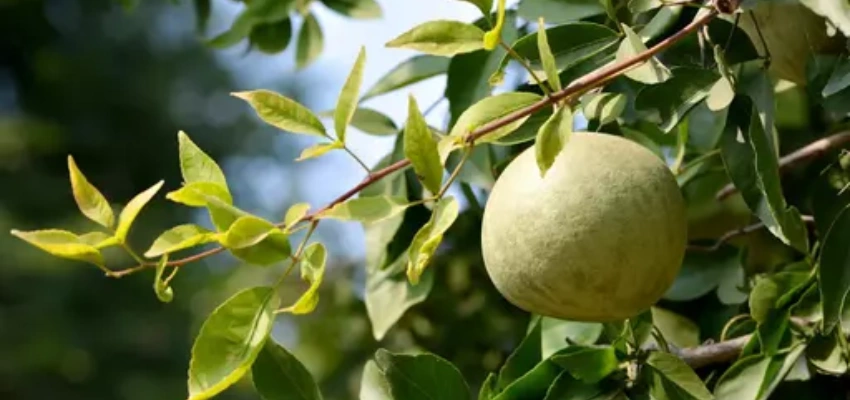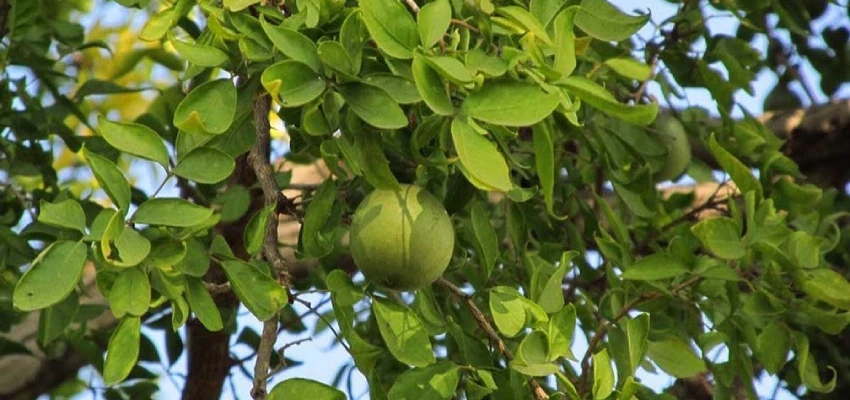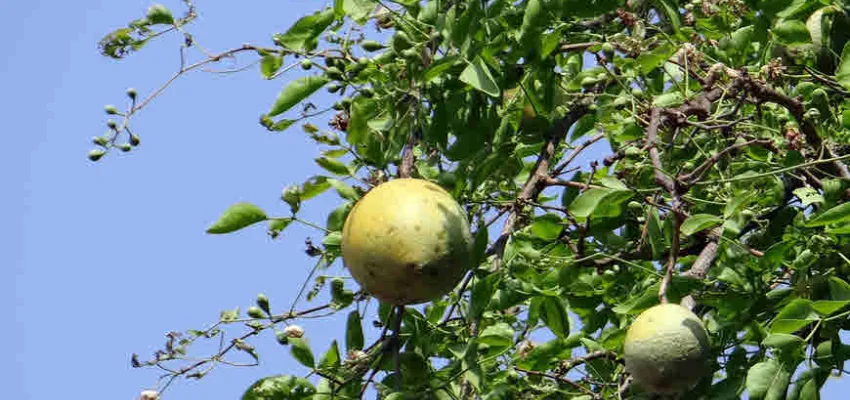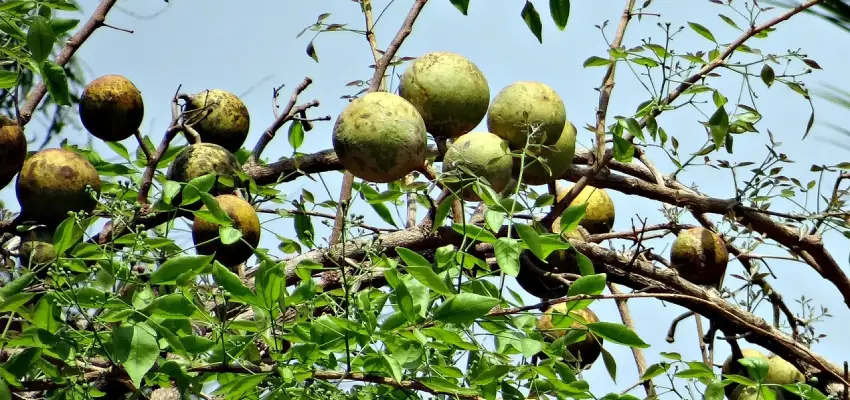The Bael fruit, scientifically known as Aegle marmelos, tropical fruit native to Indian subcontinent and Southeast Asia It has multiple names like Bengal quince, golden apple, Japanese bitter orange, stone apple or wood apple.
The bael fruit has a hard woody shell with fleshy pulp inside it which actually has a unique flavour. It also has many medicinal values and holds some traditional values as it is considered sacred by hindus and Buddhists.
The scientific classification includes
Kingdom: Plantae
Order: Sapindales
Family: Rutaceae
Subfamily: Aurantioideae
Genus: Eagle Corrêa
Species: A. marmelos
Botanical Overview
The Rutaceae family includes Aegle marmelos, often known as the Bilva plant or Bael fruit tree. This deciduous tree is indigenous to India and is distinguished by its peculiar leaves, fruits, and flowers.

The plant’s scientific name, Aegle marmelos, shows its grace and originality. The tree may grow to be 18 metres tall and has a straight, thin trunk. The leaves are fragrant, alternating, trifoliate, and oval or lanceolate in form.
The blossoms are greenish-white and fragrant. Understanding the botanical qualities gives the groundwork for investigating the diverse applications of the Bilva plant’s various components.
Have a look at agaru plant.
Understanding deep about it
As we are talking about Bael fruit, we will explore it. The fruit has a hard outer shell which is green in colour when unripe but which changes its colour to yellow when ripe.
It is a globose or pear-shaped fruit. Inside, it has fleshy aromatic pulp with its unique flavour with so many flattened-oblong shaped seeds. It ripens in December. It takes around 11 months to become edible fruit with flesh inside.
Talking about its size, it can reach up to the comparative size of a big grapefruit. Its outer shell is so hard that it needs to be braked with a hammer and when it’s broken it has the smell of roses and tastes like marmalade.
You can also look at Changeri benefits.
Forms of Bael
Now, we need to know about chemical constituents present in Bael which makes it useful for medicinal value and for other purposes as well.

- Bael juice
- Direct bael fruit
- Bael sherbet
- Bael jams
- Bael chutneys
- Bael pulp sweetened with honey
- Bael herbal preparations
Get information about – Brassica Campestris Benefits
Medicinal Properties
| Chemical constituent in Bael | Pharmacological activity |
| Aegelin | Anti-diabetic |
| Beta-sitosterol | Anti-oxidant |
| Rutin | Anti-oxidant and anti-inflammatory |
| Skimmianine | Sedative, anti-convulsive, analgesic |
| P-cymene | Anti-viral, anti-tumor, anti-bacterial, anti-fungal |
| Psoralen | Cytotoxic, anti-spasmodic |
| Auraptene | Inhibits heart rate |
| Citral | Antibacterial, anti-fungal, anti-parasitic |
| Cineol | Expectorant, disinfectant |
| D-limonene | Dissolves cholesterol packed gallstones |
| Citronellal | Anti-cancer, anti-septic |
| Eugenol | Anti-bacterial, analgesic, anti-oxidant |
| Fagarine | Anti-plasmodial |
| Imperatorin | Anti-viral |
| Luvangetin | Anti-ulcer |
| Flavone | Anti-fungal |
| Cumin aldehyde | Insecticide |
| Marmin | Anti-ulcer |
Other medicinal properties:

- Boosting Immune system as its power booster rich in vitamin C working as an antioxidant which helps to build the immune system to fight against infections.
- Harmonious gut with enriched fibres which helps in running the digestive system without any complications like away from constipation and diarrhoea. It itself has laxative properties like helping the body to remove toxins, and wastes easily out of the body. It is the primary food for people suffering from stomach pain.
- Helps to reduce stress by working as anti-oxidant which removes free radicals responsible for ageing and chronic illness like heart disease, diabetes, and also reduces cellular damages like cancer problems and inflammatory problems.
- Treats diabetes by helping to maintain blood sugar levels. So we can say it acts as a hypoglycemic effect.
- Treatment of respiratory problems by treating coughs, congestions, and reducing inflammation and so giving respiratory comfort.
- Cardiovascular health: It helps in maintaining heart strength due to prescence of high potassium levels which helps in maintaining blood pressure. This potassium helps in substituting sodium ions responsible for hypertension in people. Even, bael helps in controlling cholesterol levels.
You should also know – Apamarga plant
Contraindications
There are many allergic reactions reported with bael when taken with some drugs.
Safety Advice

- Can cause certain allergic reactions with pharmaceuticals.
- When eating bael, keep eye alert for any reactions
- Can cause stomach irritation when taken in large amounts.
- Can cause a steep decrease in blood sugar levels when eaten in high quantities.
- Should be consulted with a doctor for pregnant and breastfeeding women.
Read about – Amalaki uses
Conclusion
Finally, the Bilva plant, also known technically as Aegle marmelos, has a complex tapestry of botanical, cultural, and medicinal characteristics.
The Bilva plant is a monument to the delicate ties between nature and human well-being, from its gorgeous floral aspects to its hallowed position in religious practices and broad usage in traditional medicine.
As we continue to investigate and comprehend the numerous aspects of the Bilva plant, we uncover a world of time-tested natural treatments and cultural customs.
Consider reading –